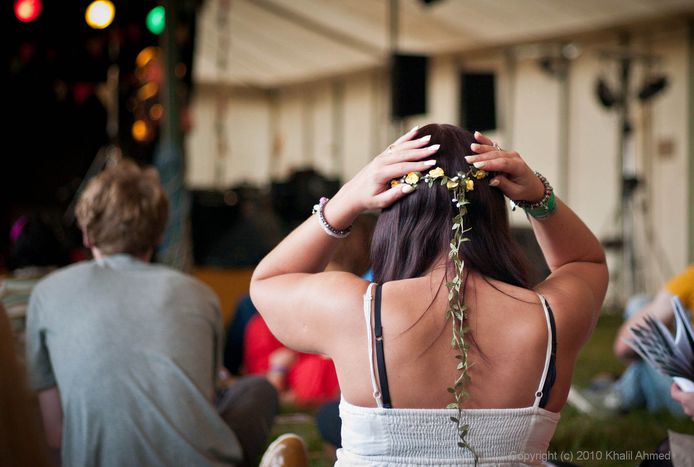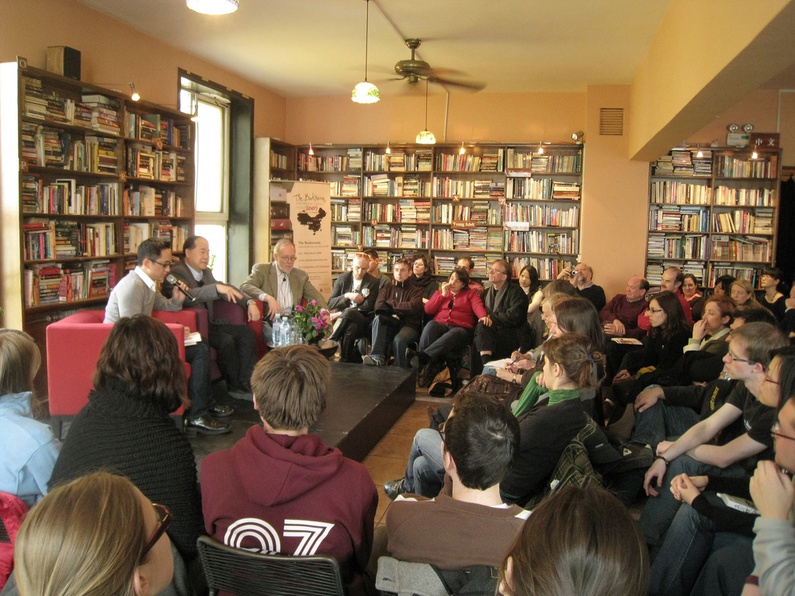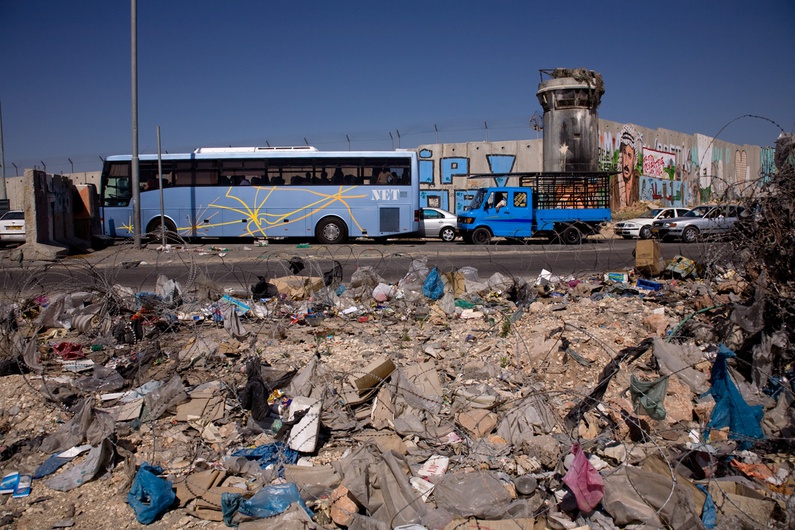
From Behind the Velvet Curtain: Notes from a Literary Festival
Published on
Summer festivals seem so far away in the dreary winter grey. An avid music festival-goer reflects on his experience at a literary festival, two events that couldn't be more different from one another. A small glimpse of the summer to come in 2015.
Not many words fill us with such good feeling as the word 'festival'. A bubble that exists beyond the pressures and cold facts of everyday existence that can so often hang heavy upon our tired and tender shoulders. After the glory years of musical festivals, I spent the summer helping to organise and host a literary festival in the quaint English town of Henley-on-Thames. The week-long festival comprised of around 150 one hour talks and interviews with best-selling authors, politicians, sportspeople, historians, illustrators and anyone else who had something interesting to say and a book to sell. David Nicholls, Sir Roger Banister, Timothy Spall and Doreen Lawrence were just a few of the faces making an appearance. Here are some observations as to how a Literary festival compares to its musical cousin.
Accommodation
Camping isn't particularly in vogue at a literary festival, it just hasn't happened yet. And a failure to realise this before you arrive is likely to result in no little ridicule and perhaps even a drop in confidence and general happiness. It can also make for a difficult and desolate night's sleep in a windy train station car park, where once optimistic notions of seducing a woman are blown away with the gusts. It turns out that they would prefer to return to their warm, well-furnished homes only ten minutes away, along with their affluent husband of 25 years.
The Crowd
 The average age of the crowd is, naturally, older. Flower-crowns, headdresses, glitter, face paint, wellies and short shorts: all items you would normally combine to bring a touch of glamour, are mostly absent. The closest you'll come to a selfie is debating whether Anne Robinson will notice you putting on her sunglasses for a photo as she interviews a few feet away. The audience generally move around at a slower speed with more care and attention given to where they need to go, and how they intend to get there, with few episodes of festival-goers barging their way to the front holding aloft a plastic duck attached to a stick. One of the odd quirks of a music festival is to see wide eyed, innocent children bouncing around inches away from wide eyed adults in the muddling midst of an out of body experience. There are children here too, although this isn't as much of a surprise as there are events catering to them. The majority of the adults in their vicinity don't appear to be feeling the effects of such a detour from sobriety.
The average age of the crowd is, naturally, older. Flower-crowns, headdresses, glitter, face paint, wellies and short shorts: all items you would normally combine to bring a touch of glamour, are mostly absent. The closest you'll come to a selfie is debating whether Anne Robinson will notice you putting on her sunglasses for a photo as she interviews a few feet away. The audience generally move around at a slower speed with more care and attention given to where they need to go, and how they intend to get there, with few episodes of festival-goers barging their way to the front holding aloft a plastic duck attached to a stick. One of the odd quirks of a music festival is to see wide eyed, innocent children bouncing around inches away from wide eyed adults in the muddling midst of an out of body experience. There are children here too, although this isn't as much of a surprise as there are events catering to them. The majority of the adults in their vicinity don't appear to be feeling the effects of such a detour from sobriety.
The Green Room

Having never had the luxury of experiencing a Green Room at a music festival, comparisons would be difficult. One thing that should be noted is that there isn't 'a big ol' stash of the white stuff' and any references to it, and repeated requests for it, will be considered neither witty nor charming. In addition, your carefully crafted playlist of club stompers and bangers won't go down like the treat you know it to be. There is an awful lot of cheese and wine — appropriate given the main sponsor is a wine company — but not a large amount of nourishing food. The vibe is relaxed and docile, with authors drifting in and out and conversations occurring between people you're certain must be important, yet who you don't recognise.
The Acts
Here the big acts are up close and all very personable: they can be seen strolling around the town, eating food and drinking beers in the pubs, suggesting they have the same human wants and needs as the rest of us. This all seems quite removed from the miniature gyrating puppets on stage recollection you have of the Rolling Stones at Glastonbury. However, they won't sing or play an instrument and are likely to act quite bemused if you ask them to do so, however polite you think you're being. Trying to strum up chants of 'we want more' when they finish their talk is also not advised. If you work backstage, prepare to touch more bra straps than you had previously imagined in your wildest underwear-related pubescent dreams. And also expect your fingers to subsequently turn into deviant slippery sausages as they attempt to get that mic on the strangely elusive strap.
The Aftermath
 When Monday morning unexpectedly rears its head, what lays before your eyes isn't a post-apocalyptic, lawless wasteland filled with weapon-laden pillagers roaming for loot. Instead appears an ordinary town, and indulging in the above behaviour might result in a spell in custody and almost certainly ill-feeling from others. Instead of strewn boxes full of unwanted Strongbow and Fosters, a large amount of decent red and white wine remains. Piling as much into your arms and trying to load your car up to the rafters isn't viewed by onlookers or festival organisers with the same admiration or respect. From the looks of the place, it would be hard to tell that a festival had even occurred there; something which is strangely satisfying, confusing and upsetting in equal measure.
When Monday morning unexpectedly rears its head, what lays before your eyes isn't a post-apocalyptic, lawless wasteland filled with weapon-laden pillagers roaming for loot. Instead appears an ordinary town, and indulging in the above behaviour might result in a spell in custody and almost certainly ill-feeling from others. Instead of strewn boxes full of unwanted Strongbow and Fosters, a large amount of decent red and white wine remains. Piling as much into your arms and trying to load your car up to the rafters isn't viewed by onlookers or festival organisers with the same admiration or respect. From the looks of the place, it would be hard to tell that a festival had even occurred there; something which is strangely satisfying, confusing and upsetting in equal measure.
With so many potential pitfalls and faux pas to avoid, a literary festival can seem a minefield to navigate for your traditional festival self. The learning curve is steep and initially difficult to understand, as you begin to act and behave in ways you never thought plausible, drinking wine out of a glass and showering. And yet what makes a festival so memorable — exposure to novel ideas (musical ones or simply voiced ones), sharing with other humans an experience out of the ordinary and the evocation of a range of emotions — stays true. Monday evening will still be spent an emotional, vulnerable, wreck: scouring Youtube for highlights and clips to return to this welcome pocket of pleasure.



